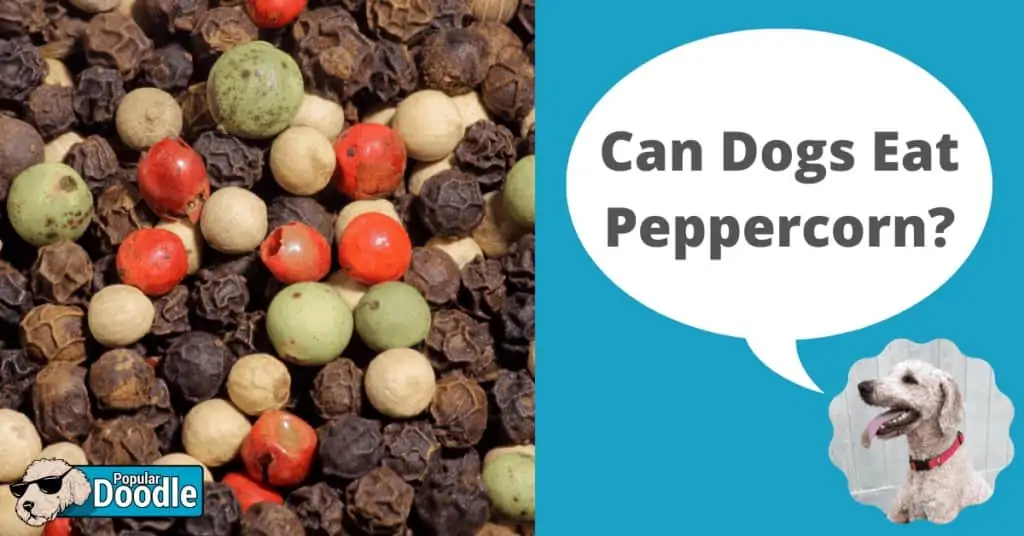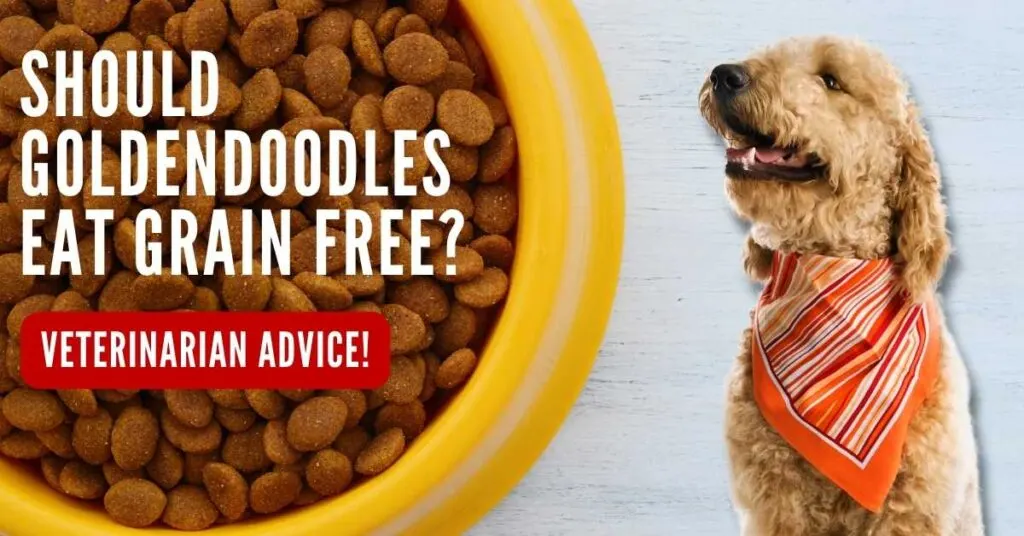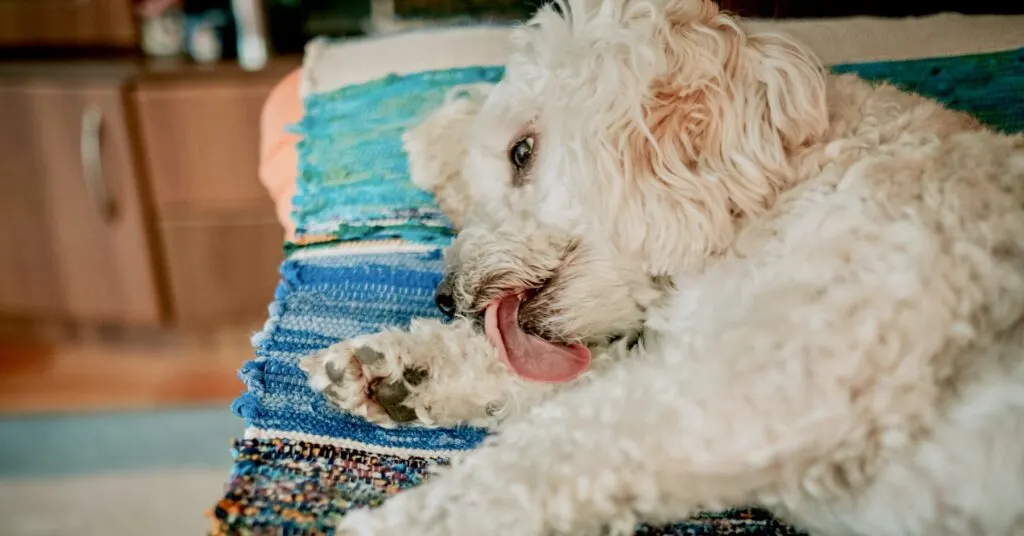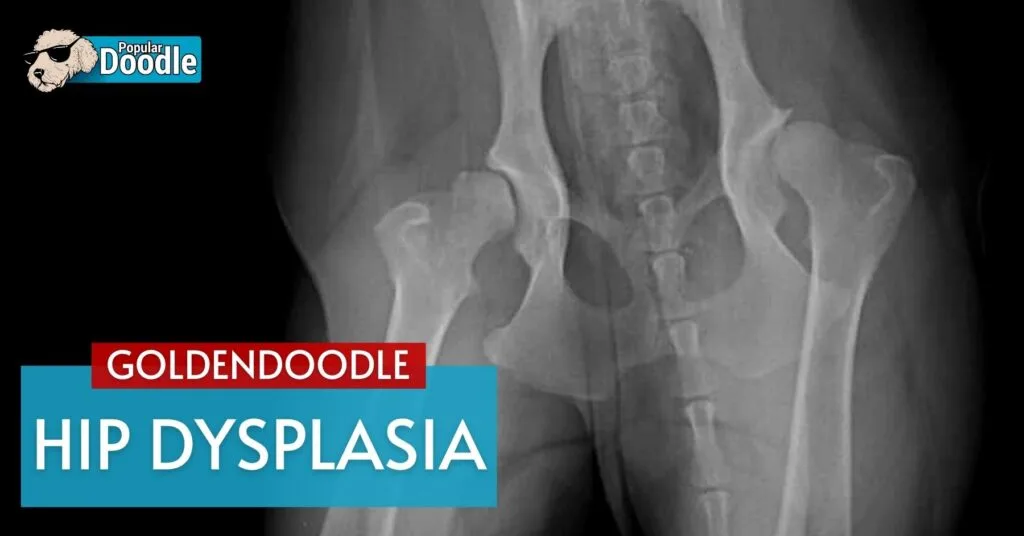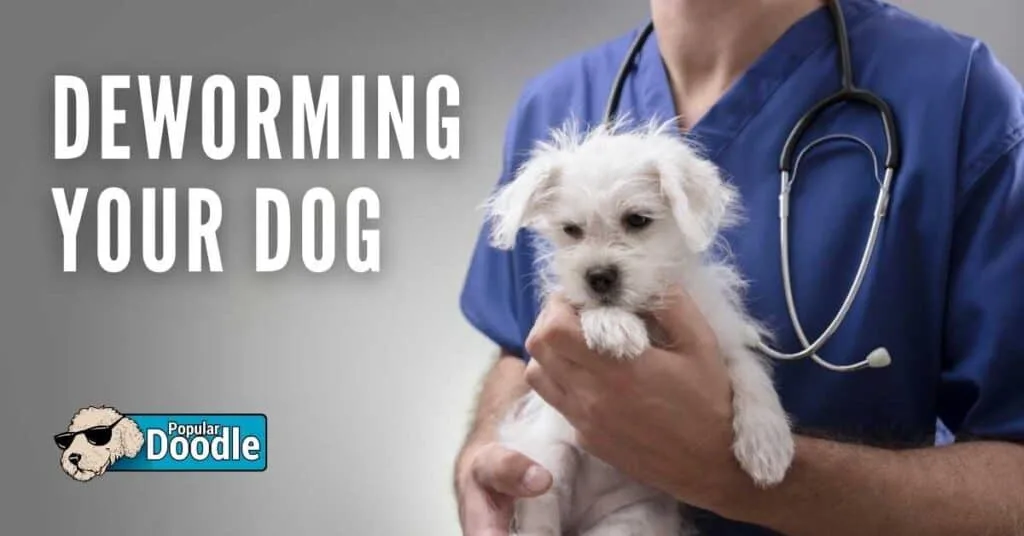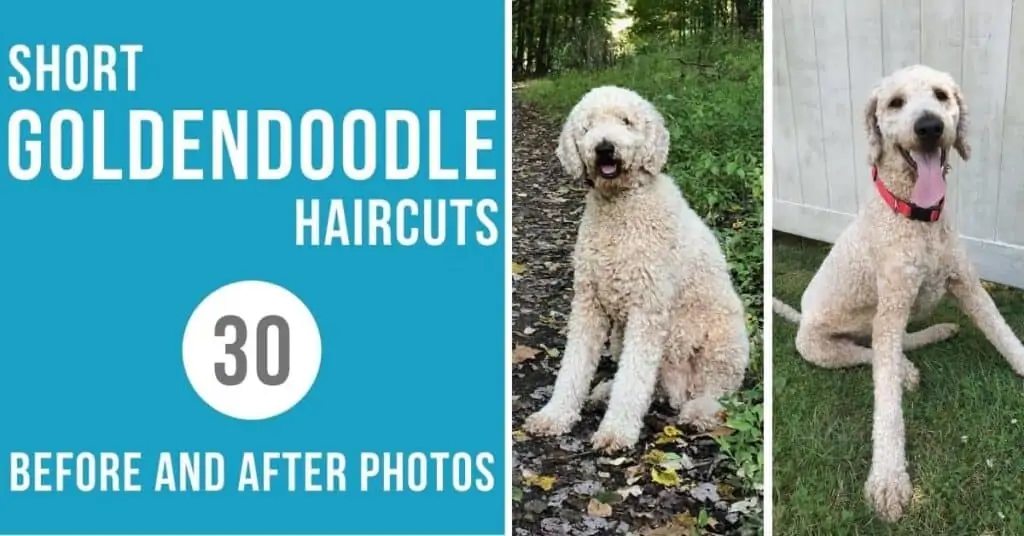By Dr. Merliza Cabriles, D.V.M.
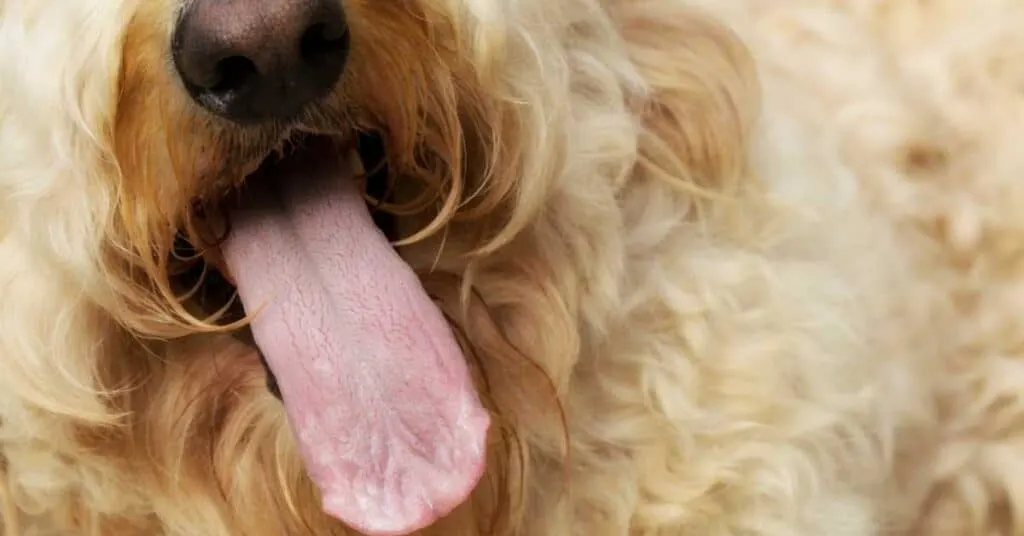
Panting is normal canine behavior. Becuase dogs don’t sweat like humans do, panting helps them regulate their body temperature. It’s their primary way to get rid of excess body heat.
When Goldendoodles pant, cool air is circulated through their bodies and body heat evaporates from their mouth and upper respiratory tract. As moisture evaporates from the dog’s mouth and tongue, hot air from the lungs exchanges with cooler air from the external environment.
During panting, the air is rapidly inhaled, humidified, and exhaled. This promotes increased evaporation of water from a dog’s nose and lungs. Evaporation cools down the dog’s body from the inside out.
Panting should not be confused with labored breathing which is characterized by strained breathing and may be accompanied by abnormal behavior and other symptoms, such as crying or whining, or a whistling sound from the dog’s nostrils or windpipe as a result of a blockage.
Not sure what to do? In non-emergencies, you can live chat with a veterinarian online by clicking here!
Is Goldendoodle Panting Normal?
As a physiologic process, panting is a vital cooling mechanism of a Goldendoodle’s body.
Like any other dog, Goldendoodles only have a few sweat glands that are located on the undersides of their paws and also within their ear passages. However, these glands have minimal cooling capabilities.
The number of sweat glands in dogs is inefficient in maintaining normal body temperature. Without an efficient set of sweat glands, Goldendoodles pant to cool themselves. Panting when engaging in exercise or play allows heat to be released in exchange for cooler air.
Related: Goldendoodle Exercise Needs by Age & Size
Panting is considered not normal when it occurs because of other reasons aside from heat dissipation. When your Goldendoodle is panting, pay closer attention to your pet’s body language.
Aside from physical activity, dogs may pant because they are happy and excited. You can see this in the happy wagging of his tail coupled with bright and happy eyes. The dog’s body language reflects his being in a relaxed and content state. Once things calm down, your Goldendoodle’s panting will eventually slow down and stop.
Why Do Goldendoodles Pant So Much? Common Causes of Heavy Breathing in Dogs
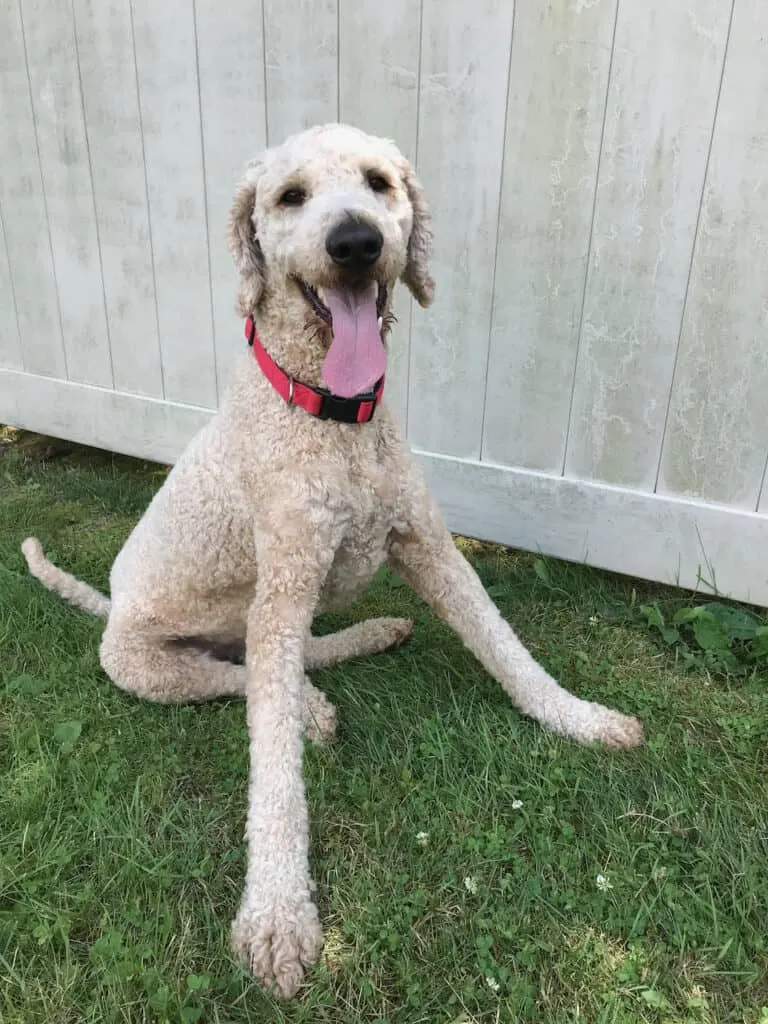
Excessive panting in Goldendoodles can be associated with a variety of issues that may require medication attention from a veterinarian.
Some of these conditions can be expensive to treat, especially in emergency situations. This is why we always recommend dog owners have pet insurance to help cover these unforeseen costs. Two great pet insurance options to compare quotes from include Healthy Paws Pet Insurance as well as Embrace Pet Insurance.
Hyperthermia / Heatstroke
Dogs are prone to heat stress because of their body’s inefficient heat dissipation mechanism. The problem is more pronounced in brachycephalic dogs like Pugs or Bulldogs because of their abnormally long soft palate and abnormal anatomical structures of their head and face.
Related: Pugapoo Dog Breed Info: Pug Poodle Mix
Hyperthermia occurs when there is an abnormal increase in body temperature.
When a dog starts to feel a little bit warm, he starts to pant. As the body temperature increases, so does the intensity of panting.
Aside from heavy panting, your Goldendoodle may also drool and their gums and tongue may appear red. Dogs suffering from heatstroke may also exhibit wide eyes and lethargy.
Heatstroke is a medical emergency that requires prompt veterinary attention.
Rapid panting leads to the evaporation of a large amount of moisture from the body within a short span of time. Make sure your Goldendoodle has easy access to fresh clean water, particularly on hot days. As much as possible, avoid outdoor excursions with your pooch during the hottest parts of the day.
Never leave your dog inside a car even for just a few minutes. A car’s interior can quickly reach scorching temperatures in as little as 10-15 minutes, even on days when the sun’s rays are milder.
Take note that when the temperature of the outside air is equal to or higher than the dog’s normal body temperature (between 68-86°F or 20-30°C), panting won’t be effective in cooling the dog’s body which can eventually lead to heatstroke.
Related: Do Goldendoodles Like Snow? (+Cold Weather Safety Tips!)
Excitement or Exposed to Stressors
Dogs that are exposed to stressful events may pant because of anxiety and fear. Fireworks, thunderstorms, visits to the vet or the groomers, car rides, and separation anxiety are just some of the most common stressors in Goldendoodles. Exposure to any of these events can cause a dog to pant and whine.
Taking steps to identify the cause of your Goldendoodle’s fear or anxiety can help you minimize exposure and stress.
Pain or Discomfort
Dogs are wired to conceal signs of pain and illness, a trait handed down from their wild ancestors. In the wild, weakness makes an animal vulnerable to predators.
However, when the condition worsens, pain and discomfort can become too much for the dog to hide and telltale signs of illness are eventually manifested. These may include panting, loss of appetite, lethargy, diarrhea, vomiting, limping, and changes in behavior.
Read More: Why is My Goldendoodle Throwing Up? (Veterinarian Advice!)
Bloat
Bloat (gastric dilation-volvulus) is a life-threatening condition that is caused by the rapid buildup of air in the stomach and the consequent twisting of the stomach on both ends. When this happens, air and other contents of the stomach are trapped inside.
If you suspect your Goldendoodle may be experiencing bloat, take them to the veterinarian immediately.
Large and giant dog breeds are more at risk for bloat compared to smaller breeds. Affected dogs appear to strain to vomit or defecate without any success. The stomach becomes distended and painful. Signs of shock—rapid heartbeat, pale gums, irregular or shallow breathing—soon sets in followed by collapse and death.
Other possible reasons for excessive panting in Goldendoodles include:
- High Fever: Panting is a dog’s effort to help lower his body temperature.
- Medications: Medications like prednisone or other types of steroids can increase a dog’s respiratory rate and trigger panting.
- A Full Stomach: Panting may precede vomiting.
- Cushing’s Disease: This is an endocrine disorder characterized by excessive production of cortisol, a stress hormone. Panting may be exhibited in affected dogs.
- Laryngeal Paralysis: The problem occurs when muscles that open and close the larynx become weak or paralyzed. Panting may be accompanied by a high-pitched wheezing sound as a result of the dysfunction of the vocal cords. Labradors and Golden Retrievers are particularly predisposed to the problem.
When Should You Be Concerned About Your Goldendoodle Panting Excessively?
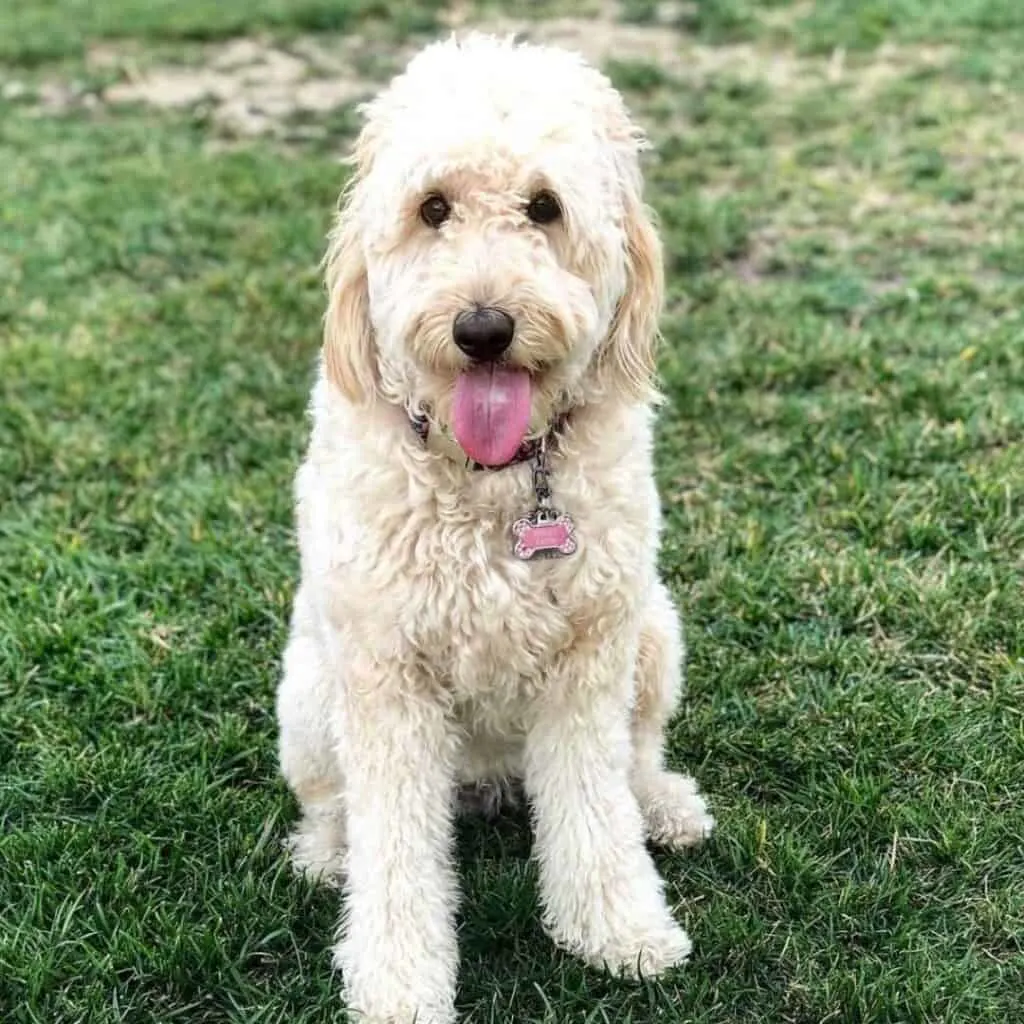
If your Goldendoodle appears to be overheating, cool your pet down by spraying them with water from a hose and move your pet to a cool and shady spot. Offer cool, clean water to drink.
It is highly recommended to call your veterinarian for guidance on what other measures to take. If there is a need to bring your pet to the vet clinic, make sure your car’s air conditioner is running.
There may be a need to place your dog on fluid and electrolyte therapy to replace any losses. Tests may also be needed to rule out certain Goldendoodle health issues that may be causing excessive panting.
If your dog’s painting appears to be extremely intense and/or accompanied by other symptoms, you should get your pet to the nearest veterinary clinic immediately. It’s better to be safe than be sorry.
In non-emergencies, you can live chat with a veterinarian online by clicking here!
More About Goldendoodles…
- Do Goldendoodles Have Dew Claws? Pros and Cons of Removal
- Why Do Goldendoodles Smell Bad? Advice from a Veterinarian!
- Does Your Goldendoodle Have Itchy Skin? Here’s How to Help!

Dr. Merliza Cabriles, D.V.M.
Contributing Professional
Dr. Merliza Cabriles is a licensed veterinarian and university professor with many years of experience in food animal and pet companion medicine. Her passion for writing as well as pet parent education and support is echoed in the articles and ebooks she has written.



